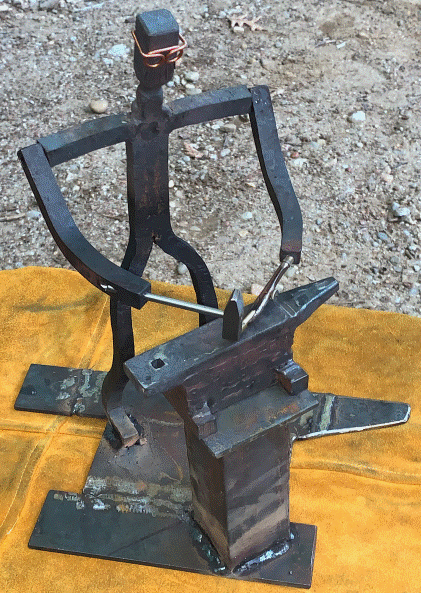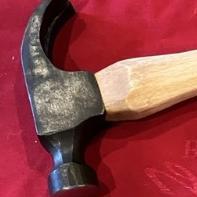
gote
Members-
Posts
779 -
Joined
-
Last visited
Profile Information
-
Gender
Male
-
Location
Central Sweden near Örebro
Recent Profile Visitors
6,244 profile views
-
Traditional blackmsithing.
gote replied to EJRailRoadTrack's topic in Blacksmithing, General Discussion
I think that this was covered in Farenheit 451: According to Beatty, special-interest groups and other “minorities” objected to books that offended them. Soon, books all began to look the same, as writers tried to avoid offending anybody. This was not enough, however, and society as a whole decided to simply burn books . Just you wait Professor Higgins just you wait We have it here too. A couple of public libraries started censoring books but fortunately they were slapped by the authorities since the practice was unconstitutional. I have seen someone objecting on IFI to bastard files. Now the medieval use of the word was in no way pejorative. Google "the bastard of Orleans". -
Traditional blackmsithing.
gote replied to EJRailRoadTrack's topic in Blacksmithing, General Discussion
Agree absolutely. However, we sometimes encounter words that are not generally known but "rediscovered" by authors and public. My English is not good enough to give Engish examples but there are many Swedish words current in my youth and used by good authors which are unknown to my children not to talk about my grandchildren. One reversal is that some Swedish terrestial orchids used to be called "Nyckelblomster" (Key flowers because of the shape of the lip. Same word in German Schlüsselblume). However, a famous Swedish poet ( Erik Karlfeldt (Nobel prize)) referred to them as "Yxne" which was a very local name but fitted a poem. Now they seem to be called yxne by everybody. A local forgotten name is replacing the "standardl" one. Of course, as you write, Karlfeldt made it quite clear by context that a rare flower was meant. Thomas. I am always amazed at your erudition I rise my hat (when I get it bak from where I mislaid it) and bow deeply. -
Traditional blackmsithing.
gote replied to EJRailRoadTrack's topic in Blacksmithing, General Discussion
Words that are loaded enough to be used in this way usually has several meanings. Of course some meanings are more common than others but since we are talking about spoken languages mot programming languages all meanings can be valid in certain contexts. The speaker really has the right to choose. What would happen to literature if the author must chose his words after a standard. 1984 is long past but the era may still be in front of us. -
Traditional blackmsithing.
gote replied to EJRailRoadTrack's topic in Blacksmithing, General Discussion
Absolutely! You are so right! However I was thinking of something that here is called "tolkningsföreträde" (prerogative to interprete). The question is: Has the speaker or the listener right to decide what has been meant? It is sometimes used in discussions. A says something whereupon B deliberately misinterpretes and calls A a moron/raceist/pig or whatever. In my view only the speaker can know what is meant and the listener cannot take over this right although especially politicians often do. -
Traditional blackmsithing.
gote replied to EJRailRoadTrack's topic in Blacksmithing, General Discussion
OK but I sometimes see a situation where the listener choses to interprete a word in a way the listener knows the speaker did not intend. Who is then right? "Traditional" is one of those words that need a context. It means belonging to a certain tradition. Without that tradition being specified, it can mean anything. To me, traditional blacksmiting means using hammer, anvil and a solid fuel forge. However, to me, it also means that the products have a style that goes back a couple of hundred years or more - even if a grinder has been used instead of a hacksaw instead of a hardy. Some people frown on reproduction furniture and other paraphernalia. I think they are wrong. There are designs that are (very) old but still very good. -
You have got the two "difficult" items in a blacksmith shop. Read threds in the forge section. You can set up a forge quite easily and cheaply. Then you are fit to go. I assume yo own some hammers. If you use longish stock, you will not need any tongs. When you get a little further down the road you make your own tongs. Good luck. PS There are waxes and oils that are more efficient than linseed oil (but not so traditiional LO is may be the best for a third generation heirloom). You can find out about that here as well.
-
You can also figure out a way to divert a part of the air stream elsewhere. There are many ways depending upon what kind of junk (sorry I mean material) you have lying around.
-
I mean the thread where Thomas describes how to do it in detail. IMHO it is a great text for a beginner I did not find it in the sniffimg thread.
-
Have you heard about a guy called Occham? A reasonable answer would be: "The last time one of these were sold it was in good condition and changed hands in XX at YY$". In other places than IFI this would be the likely answer. It would also make the questioner feel more welcome, Now let us make the question more elaborste. Can YOU answer the question on the condition that it were sold as an antique in New England and were complete but worn and without amateurish renovations. Or for that matter on any other condition? PS. I did not say that it was milk retail price in the supermarket.
-
OOPS I cannot find Thomas original description of TPAAAT Where is it??
-
I think that there is a tendency to overdo this call for precision. Would you put the same set of questions to someone asking for the price of a pint of milk. Worth to a cow, a starving calf, as coolant in a vehicle, as refrigerant, as ....... The guy means "what would a reasonably complete original be sold for?" Normally any object older than a hundred years is an antique (Anvils and certain musical intruments excepted) and traded as such.
-
Hej Joakim Det är väl bäst att jag fortsätter på engelska I cannot add much to the advice you have been given (which is very sound) but: Read up the Thomas Powers Applied Anvil Acquisition Technique (a thread under 'Anvils') It will apply also to places where you can set up. Do you not have any friend or relation who is or knows a friendly farmer who is not too far away? Around here, many would give you a welcome. Even if you are a beginner, there is usually something that needs straightening or bending on a farm. I am unsure about "allemansrätten" in Norway. In Sweden you would need to ask the landowner for a smithing operation.
-
Herr Kant claimed that one could not know "das Ding an sich". (The thing as itself) Since he claimed that it was impossible to know the true nature of anything he must have doubted that he himself existed in the way he saw himself. Of course we can discard his ideas and believe he existed in the way we believe but then we probably must discard Herr Heisenberg as well. Somehow M. Descartes solved part of the enigma: I think (about my existence) Thus I exist. Question: Do we know for sure that Kant did think or was that just a quantuum fluctuation? Since so may claimed that Shakespeare did not write his plays, perhaps Shakespeare wrote the "Kritik"
-
A shop (or home) is never finished. If it is, it turns into a museum. (Just laid in my wooden floor. more shelves next)
-
Or the inside of your nose throat and lungs




